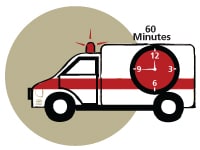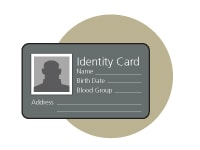
How To Deal With A Medical Emergency
In a medical emergency, timely response could make all the difference. Here’s a checklist of things you should do before, so you are always ready to act quickly
GET TO A HOSPITAL IN 60 MINUTES, OR LESS

The top three reasons people visit an emergency room (ER) are “heart attack, a stroke, or an accident,” says Dr. Mabel Vasnaik, ER specialist and former president of the Society for Emergency Medicine, India. In the case of a heart attack or accident, the patient must get to a hospital within 60 minutes. “Go to the nearest big place, and not the smallest nursing home close by. Avoid taking an auto, and keep the person’s spine as still as possible.”
KEEP YOUR MEDICAL HISTORY HANDY

This helps doctors get information such as what the patient has been treated for earlier and what they might be allergic to. And to prepare for a situation where you might be the one requiring emergency medical attention, ensure you have a contact person who knows you and your medical history well or has access to your medical files and can bring them to the hospital. “It is important to give us your primary doctor’s name and number too,” says Dr. Sudarshan Ballal, medical superintendent, Manipal Hospitals.
KNOW A HOSPITAL’S EMERGENCY SERVICES

Most large hospitals have a resident consultant who will be able to diagnose you, and hospitalise and stabilise you. A good emergency doctor will not let you leave till your condition has stabilised. It is best to go to a large hospital, as smaller ones tend to keep junior doctors in their emergency rooms.
KEEP AN ID CARD WITH VITAL DETAILS

The biggest mistake people make is not have their basic information in place. A driving license is not enough. Vital details should include your blood group and a contact person in case of an emergency. If you are alone, and end up unconscious, this lack of information can leave the hospital in a quandary.
KEEP SOME CASH ASIDE
(This story appears in the 30 November, -0001 issue of Forbes India. To visit our Archives, click here.)



 “People should know what [insurance] they have bought, what they are covered for, what their sub-limits are,” says Shefali Chhachhi, director, marketing, Max Bupa Health Insurance Company. The health card from insurance companies has details of the policy and emergency numbers of partner hospitals. Store your insurance policy number and the emergency contact number on your mobile phone if you can’t keep the card with you. Call your insurance company within 48 hours of the emergency so that the hospital is notified that the patient is covered by insurance.
“People should know what [insurance] they have bought, what they are covered for, what their sub-limits are,” says Shefali Chhachhi, director, marketing, Max Bupa Health Insurance Company. The health card from insurance companies has details of the policy and emergency numbers of partner hospitals. Store your insurance policy number and the emergency contact number on your mobile phone if you can’t keep the card with you. Call your insurance company within 48 hours of the emergency so that the hospital is notified that the patient is covered by insurance.



